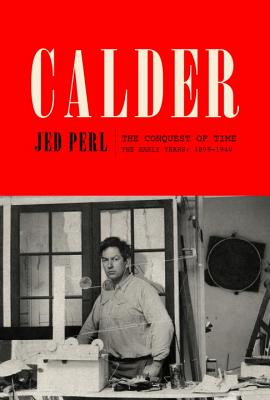The first biography of America’s greatest twentieth-century sculptor, Alexander Calder: an authoritative and revelatory achievement, based on a wealth of letters and papers never before available, and written by one of our most renowned art critics.
Alexander Calder is one of the most beloved and widely admired artists of the twentieth century. Anybody who has ever set foot in a museum knows him as the inventor of the mobile, America’s unique contribution to modern art. But only now, forty years after the artist’s death, is the full story of his life being told in this biography,which is based on unprecedented access to Calder’s letters and papers as well as scores of interviews. Jed Perl shows us why Calder was--and remains--a barrier breaker, an avant-garde artist with mass appeal.
This beautifully written, deeply researched book opens with Calder’s wonderfully peripatetic upbringing in Philadelphia, California, and New York. Born in 1898 into a family of artists--his father was a well-known sculptor, his mother a painter and a pioneering feminist--Calder went on as an adult to forge important friendships with a who’s who of twentieth-century artists, including Joan Miró, Marcel Duchamp, Georges Braque, and Piet Mondrian. We move through Calder’s early years studying engineering to his first artistic triumphs in Paris in the late 1920s, and to his emergence as a leader in the international abstract avant-garde. His marriage in 1931 to the free-spirited Louisa James--she was a great-niece of Henry James--is a richly romantic story, related here with a wealth of detail and nuance.
Calder’s life takes on a transatlantic richness, from New York’s Greenwich Village in the Roaring Twenties, to the Left Bank of Paris during the Depression, and then back to the United States, where the Calders bought a run-down old farmhouse in western Connecticut. New light is shed on Calder’s lifelong interest in dance, theater, and performance, ranging from the Cirque Calder, the theatrical event that became his calling card in bohemian Paris to collaborations with the choreographer Martha Graham and the composer Virgil Thomson. More than 350 illustrations in color and black-and-white--including little-known works and many archival photographs that have never before been seen--further enrich the story.
| FindBook |
有 1 項符合
Calder: The Conquest of Time: The Early Years, 1898-1940的圖書 |
 |
Calder: The Conquest of Time: The Early Years, 1898-1940 作者:Perl 出版社:Alfred a Knopf Inc 出版日期:2017-10-24 語言:英文 規格:精裝 / 19.1 x 24.1 x 4.4 cm / 普通級 |
| 圖書館借閱 |
| 國家圖書館 | 全國圖書書目資訊網 | 國立公共資訊圖書館 | 電子書服務平台 | MetaCat 跨館整合查詢 |
| 臺北市立圖書館 | 新北市立圖書館 | 基隆市公共圖書館 | 桃園市立圖書館 | 新竹縣公共圖書館 |
| 苗栗縣立圖書館 | 臺中市立圖書館 | 彰化縣公共圖書館 | 南投縣文化局 | 雲林縣公共圖書館 |
| 嘉義縣圖書館 | 臺南市立圖書館 | 高雄市立圖書館 | 屏東縣公共圖書館 | 宜蘭縣公共圖書館 |
| 花蓮縣文化局 | 臺東縣文化處 |
|
|
圖書介紹 - 資料來源:博客來 評分:
圖書名稱:Calder: The Conquest of Time: The Early Years, 1898-1940
|








 公職考試2025試題大補帖【刑法與刑事訴訟法(含刑法與刑事訴訟法概要)】(108~113年試題)(申論題型)[適用三等、四等/高考、普考、地方特考、警察特考](CK4122)](https://media.taaze.tw/showLargeImage.html?sc=14100119390)


 公職考試2025試題大補帖【立法程序與技術】(103~113年試題)(申論題型)[適用三等/高考、地方特考](CK4121)](https://media.taaze.tw/showLargeImage.html?sc=14100119389)